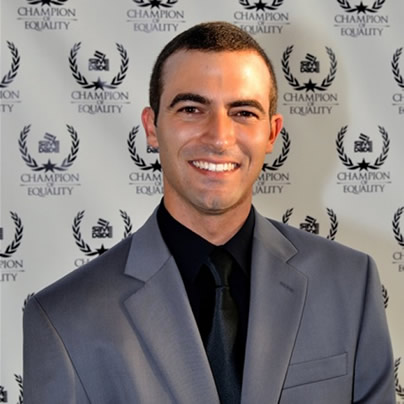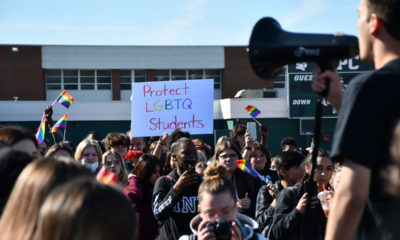National
Florida LGBT rights movement grows more visible
Local, state officials more receptive to advocates’ concerns

ST. PETERSBURG, Fla.—St. Petersburg City Councilman Steve Kornell was at his first candidate debate in 2009 when a woman in the audience asked him to respond to a “rumor” that he was gay. There was an audible gasp in the room, but Kornell did not hesitate to acknowledge his sexual orientation.
Even his opponents applauded him.
“Even though I was completely out, thousands of people didn’t know me at all so they didn’t know that about me,” Kornell, whom voters elected to represent the city’s Pinellas Point neighborhood in 2009, told the Washington Blade during a Feb. 4 interview near his home. “Somebody could have used that as an attack, and my response to that was I’m going to put it right out there.”
Kornell is among the public faces of a statewide LGBT rights movement whose profile has grown significantly over the last 15 years.
Nadine Smith, executive director of Equality Florida, said she had difficulty putting together a statewide board of directors when the organization formed in 1997 because people were afraid they would lose their jobs if they were outed. Journalists who wanted to cover Equality Florida events had to stand in the back of the room. They could only film the backs of the heads of those who had given their permission to appear on camera.
“When people stepped forward to the microphone at a county commissioner or a city council meeting to talk about the need for basic discrimination protection, they were literally risking their job,” Smith said. “There are some parts of Florida where that remains true.”
Only a handful of cities and counties included gay-specific protections in their anti-discrimination and anti-bullying ordinances in 1997. That number has grown to dozens of municipalities throughout the state.
Then-Gov. Charlie Crist in 2010 announced Florida would no longer enforce a law that banned gays and lesbians from adopting children in response to a state appellate court that found the 1977 statute unconstitutional. He signed the state’s LGBT-inclusive anti-bullying law in 2008.
State Reps. Joe Saunders (D-Orlando) and Dave Richardson (D-Miami Beach) last year made history as the first openly gay candidates elected to the state legislature. The Florida Senate Committee on Children, Families and Elder Affairs on Feb. 19 will debate a bill sponsored by state Sen. Eleanor Sobel (D-Hollywood) that would create a statewide domestic partnership registry.
Saunders and state Sen. Joe Abruzzo (D-Wellington) on Feb. 7 filed the Florida Competitive Workforce Act that would add sexual orientation and gender identity and expression to the state’s employment non-discrimination law. State Rep. Holly Raschein (R-Key West) is the proposal’s primary co-sponsor.
“Florida has changed dramatically over the last 15 years,” Smith said. “The change has accelerated in just the past three or four years.”
In spite of the aforementioned victories, the movement has suffered a series of stinging setbacks over the last decade.
Voters in 2008 approved a state constitutional amendment that defined marriage as between a man and a woman.
The Hillsborough County Commission on Jan. 24 voted 4-3 against a proposed countywide domestic partner registry — commissioners in neighboring Pinellas County that includes St. Petersburg nine days earlier approved an identical registry for unmarried same-sex and heterosexual couples. The Lake County School Board’s move to ban extra-curricular clubs in the district after a group of middle school students in Leesburg tried to form a GSA has sparked outrage among LGBT advocates and their supporters.
Smith noted the board’s announcement coincided with a near unanimous vote in the Tavares City Council on Feb. 6 that created Lake County’s first domestic partner registry.
“It’s not a direct line between here and there,” she said. “It’s a zigzag line and forward motion and push back, but the message we deliver is we’re going to keep coming because we’re fighting for our lives, for our families, for many of us for our children. We’re never going to give up.”
CJ Ortuño, executive director of SAVE (Safeguarding American Values for Everyone) Dade, brings this message to his advocacy.
The Miami Beach resident who is a straight man of Cuban descent told the Blade that a gay man named John introduced his parents. He and his partner lived downstairs, and gave them the dining room table from which Ortuño’s young daughter Amalia eats.
Ortuño said he decided to become involved with the movement during President Obama’s first presidential campaign in 2008 — the same year Florida voters approved the constitutional same-sex marriage ban.
“It was me staring at my daughter and saying, ‘I don’t know who she’s going to love when she gets older, but I’ll definitely be damned if I don’t do something,” he said. “I want to change this world and leave it a little better than the way I found it.”
SAVE Dade, which was founded in 1993 in the wake of the Anita Bryant-led movement that successfully repealed Dade County’s gay-inclusive human rights ordinance, continues to work with local municipalities to offer domestic partner benefits to their LGBT employees.
The Coral Gables City Commission last October unanimously approved domestic partner benefits to LGBT employees — more than a year after lesbian police officer Rene Tastet filed a complaint with the city manager’s office after she did not receive bereavement leave to attend her partner’s father’s funeral in North Carolina. The organization is also lobbying the Miami-Dade County Commission to add gender identity and expression to the county’s human rights ordinance.
“I think we can do that this year like our neighbors to the north (Broward County) and south (Monroe County) of us,” Ortuño said.
SAVE Dade also works with Congresswoman Ileana Ros-Lehtinen and other members of South Florida’s congressional delegation on immigration reform — and especially the Uniting American Families Act that would allow gays and lesbians to sponsor their foreign-born partners for residency in the United States. The organization also advocates for the re-authorization of the Ryan White CARE Act.
“We do the same thing on a statewide level,” he said, noting Miami-Dade has the largest legislative delegation in Tallahassee. “We don’t drive state policy, but we often support or provide resources through our Dade delegation.”
Smith said Equality Florida, which has chapters throughout the state, looks to its local partners to cultivate relationships with lawmakers in Tallahassee.
“They have a constituency that they are accountable to,” she said. “We really look to our local partners to help us reach out and cultivate these relationships. We do so much local work that the partnerships are essential.”
Saunders told the Blade during a Feb. 1 interview in his Orlando office that some of his fellow lawmakers are “still trying to readjust and figure out how to deal with this new community that’s now represented” in light of his and Richardson’s election. Kornell said his presence on the St. Petersburg City Council has had what he described as a positive impact on LGBT-specific issues.
St. Petersburg Mayor Bill Foster, whom Kornell said made some “less than pro-gay” statements when he was a city councilman, approved his proposal to extend domestic partner benefits to the city’s 1,800 non-unionized employees.
“The mayor went ahead and did it,” Kornell said. “That’s the kind of thing when we have gay people sitting at the table; those kinds of things start to shift. It’s hard to hate somebody when you get to know them.”
Pennsylvania
Malcolm Kenyatta could become the first LGBTQ statewide elected official in Pa.
State lawmaker a prominent Biden-Harris 2024 reelection campaign surrogate

Following his win in the Democratic primary contest on Wednesday, Pennsylvania state Rep. Malcolm Kenyatta, who is running for auditor general, is positioned to potentially become the first openly LGBTQ elected official serving the commonwealth.
In a statement celebrating his victory, LGBTQ+ Victory Fund President Annise Parker said, “Pennsylvanians trust Malcolm Kenyatta to be their watchdog as auditor general because that’s exactly what he’s been as a legislator.”
“LGBTQ+ Victory Fund is all in for Malcolm, because we know he has the experience to win this race and carry on his fight for students, seniors and workers as Pennsylvania’s auditor general,” she said.
Parker added, “LGBTQ+ Americans are severely underrepresented in public office and the numbers are even worse for Black LGBTQ+ representation. I look forward to doing everything I can to mobilize LGBTQ+ Pennsylvanians and our allies to get out and vote for Malcolm this November so we can make history.”
In April 2023, Kenyatta was appointed by the White House to serve as director of the Presidential Advisory Commission on Advancing Educational Equity, Excellence and Economic Opportunity for Black Americans.
He has been an active surrogate in the Biden-Harris 2024 reelection campaign.
The White House
White House debuts action plan targeting pollutants in drinking water
Same-sex couples face higher risk from environmental hazards

Headlining an Earth Day event in Northern Virginia’s Prince William Forest on Monday, President Joe Biden announced the disbursement of $7 billion in new grants for solar projects and warned of his Republican opponent’s plans to roll back the progress his administration has made toward addressing the harms of climate change.
The administration has led more than 500 programs geared toward communities most impacted by health and safety hazards like pollution and extreme weather events.
In a statement to the Washington Blade on Wednesday, Brenda Mallory, chair of the White House Council on Environmental Quality, said, “President Biden is leading the most ambitious climate, conservation, and environmental justice agenda in history — and that means working toward a future where all people can breathe clean air, drink clean water, and live in a healthy community.”
“This Earth Week, the Biden-Harris Administration announced $7 billion in solar energy projects for over 900,000 households in disadvantaged communities while creating hundreds of thousands of clean energy jobs, which are being made more accessible by the American Climate Corps,” she said. “President Biden is delivering on his promise to help protect all communities from the impacts of climate change — including the LGBTQI+ community — and that we leave no community behind as we build an equitable and inclusive clean energy economy for all.”
Recent milestones in the administration’s climate policies include the U.S. Environmental Protection Agency’s issuance on April 10 of legally enforceable standard for detecting and treating drinking water contaminated with polyfluoroalkyl substances.
“This rule sets health safeguards and will require public water systems to monitor and reduce the levels of PFAS in our nation’s drinking water, and notify the public of any exceedances of those levels,” according to a White House fact sheet. “The rule sets drinking water limits for five individual PFAS, including the most frequently found PFOA and PFOS.”
The move is expected to protect 100 million Americans from exposure to the “forever chemicals,” which have been linked to severe health problems including cancers, liver and heart damage, and developmental impacts in children.
An interactive dashboard from the United States Geological Survey shows the concentrations of polyfluoroalkyl substances in tapwater are highest in urban areas with dense populations, including cities like New York and Los Angeles.
During Biden’s tenure, the federal government has launched more than 500 programs that are geared toward investing in the communities most impacted by climate change, whether the harms may arise from chemical pollutants, extreme weather events, or other causes.
New research by the Williams Institute at the UCLA School of Law found that because LGBTQ Americans are likelier to live in coastal areas and densely populated cities, households with same-sex couples are likelier to experience the adverse effects of climate change.
The report notes that previous research, including a study that used “national Census data on same-sex households by census tract combined with data on hazardous air pollutants (HAPs) from the National Air Toxics Assessment” to model “the relationship between same-sex households and risk of cancer and respiratory illness” found “that higher prevalence of same-sex households is associated with higher risks for these diseases.”
“Climate change action plans at federal, state, and local levels, including disaster preparedness, response, and recovery plans, must be inclusive and address the specific needs and vulnerabilities facing LGBT people,” the Williams Institute wrote.
With respect to polyfluoroalkyl substances, the EPA’s adoption of new standards follows other federal actions undertaken during the Biden-Harris administration to protect firefighters and healthcare workers, test for and clean up pollution, and phase out or reduce use of the chemicals in fire suppressants, food packaging, and federal procurement.
Maine
Maine governor signs transgender, abortion sanctuary bill into law
Bomb threats made against lawmakers before measure’s passage

BY ERIN REED | On Tuesday, Maine Gov. Janet Mills signed LD 227, a sanctuary bill that protects transgender and abortion providers and patients from out-of-state prosecution, into law.
With this action, Maine becomes the 16th state to explicitly protect trans and abortion care in state law from prosecution. This follows several bomb threats targeting state legislators after social media attacks from far-right anti-trans influencers such as Riley Gaines and Chaya Raichik of Libs of TikTok.
An earlier version of the bill failed in committee after similar attacks in January. Undeterred, Democrats reconvened and added additional protections to the bill before it was passed into law.
The law is extensive. It asserts that gender-affirming care and reproductive health care are “legal rights” in Maine. It states that criminal and civil actions against providers and patients are not enforceable if the provision or access to that care occurred within Maine’s borders, asserting jurisdiction over those matters.
It bars cooperation with out-of-state subpoenas and arrest warrants for gender-affirming care and abortion that happen within the state. It even protects doctors who provide gender-affirming care and abortion from certain adverse actions by medical boards, malpractice insurance, and other regulating entities, shielding those providers from attempts to economically harm them through out-of-state legislation designed to dissuade them from providing care.
You can see the findings section of the bill here:
The bill also explicitly enshrines the World Professional Association of Transgender Health’s Standards of Care, which have been the target of right-wing disinformation campaigns, into state law for the coverage of trans healthcare:
The bill is said to be necessary due to attempts to prosecute doctors and seek information from patients across state lines. In recent months, attorneys general in other states have attempted to obtain health care data on trans patients who traveled to obtain care. According to the U.S. Senate Finance Committee, attorneys general in Tennessee, Indiana, Missouri, and Texas attempted to obtain detailed medical records “to terrorize transgender teens in their states … opening the door to criminalizing women’s private reproductive health care choices.”
The most blatant of these attempts was from the attorney general of Texas, who, according to the Senate Finance Committee, “sent demands to at least two non-Texas entities.” One of these entities was Seattle Children’s Hospital, which received a letter threatening administrators with arrest unless they sent data on Texas patients traveling to Seattle to obtain gender-affirming care.
Seattle Children’s Hospital settled that case out of court this week, agreeing to withdraw its Texas business registration in return for Texas dropping its investigation. This likely will have no impact on Seattle Children’s Hospital, which has stated it did not treat any youth via telemedicine or in person in Texas; the hospital will be able to continue treating Texas youth who travel outside of Texas to obtain their care. That settlement was likely compelling due to a nearly identical law in Washington that barred out-of-state investigations on trans care obtained solely in the state of Washington.
The bill has faced a rocky road to passage. A similar bill was debated in January, but after coming under intense attack from anti-trans activists who misleadingly called it a “transgender trafficking bill,” the bill was voluntarily withdrawn by its sponsor.
When LD 227 was introduced, it faced even more attacks from Gaines and Libs of TikTok. These attacks were followed by bomb threats that forced the evacuation of the legislature, promising “death to pedophiles” and stating that a bomb would detonate within a few hours in the capitol building.
Despite these threats, legislators strengthened both the abortion and gender-affirming care provisions and pressed forward, passing the bill into law. Provisions found in the new bill include protecting people who “aid and assist” gender-affirming care and abortion, protections against court orders from other states for care obtained in Maine, and even protections against adverse actions by health insurance and malpractice insurance providers, which have been recent targets of out-of-state legislation aimed at financially discouraging doctors from providing gender-affirming care and abortion care even in states where it is legal.
See a few of the extensive health insurance and malpractice provisions here:
Speaking about the bill, Gia Drew, executive director of Equality Maine, said in a statement, “We are thrilled to see LD 227, the shield bill, be signed into law by Gov. Mills. Thanks to our pro equality and pro reproductive choice elected officials who refused to back down in the face of disinformation. This bill couldn’t come into effect at a better time, as more than 40 percent of states across the country have either banned or attempted to block access to reproductive care, which includes abortions, as well as transgender healthcare for minors. Thanks to our coalition partners who worked tirelessly to phone bank, lobby, and get this bill over the finish line to protect community health.”
Destie Hohman Sprague of the Maine Women’s Lobby celebrated the passage of the bill despite threats of violence, saying in a statement, “A gender-just Maine ensures that all Mainers have access to quality health care that supports their mental and physical wellbeing and bodily autonomy, including comprehensive reproductive and gender-affirming care. We celebrate the passage of LD 227, which helps us meet that goal. Still, the patterns of violence and disinformation ahead of the vote reflected the growing connections between misogyny, extremism, and anti-democratic threats and actions. We must continue to advocate for policies that protect bodily autonomy, and push back against extremist rhetoric that threatens our states’ rights and our citizens’ freedoms.”
The decision to pass the legislation comes as the Biden administration released updated HIPAA protections that protect “reproductive health care” from out-of-state prosecutions and investigations.
Although the definition of “reproductive health care” is broad in the new HIPAA regulations, it is uncertain whether they will include gender-affirming care. For at least 16 states, though, gender-affirming care is now explicitly protected by state law and shielded from out-of-state legislation, providing trans people and those seeking abortions with protections as the fight increasingly crosses state lines.
****************************************************************************

Erin Reed is a transgender woman (she/her pronouns) and researcher who tracks anti-LGBTQ+ legislation around the world and helps people become better advocates for their queer family, friends, colleagues, and community. Reed also is a social media consultant and public speaker.
******************************************************************************************
The preceding article was first published at Erin In The Morning and is republished with permission.

























